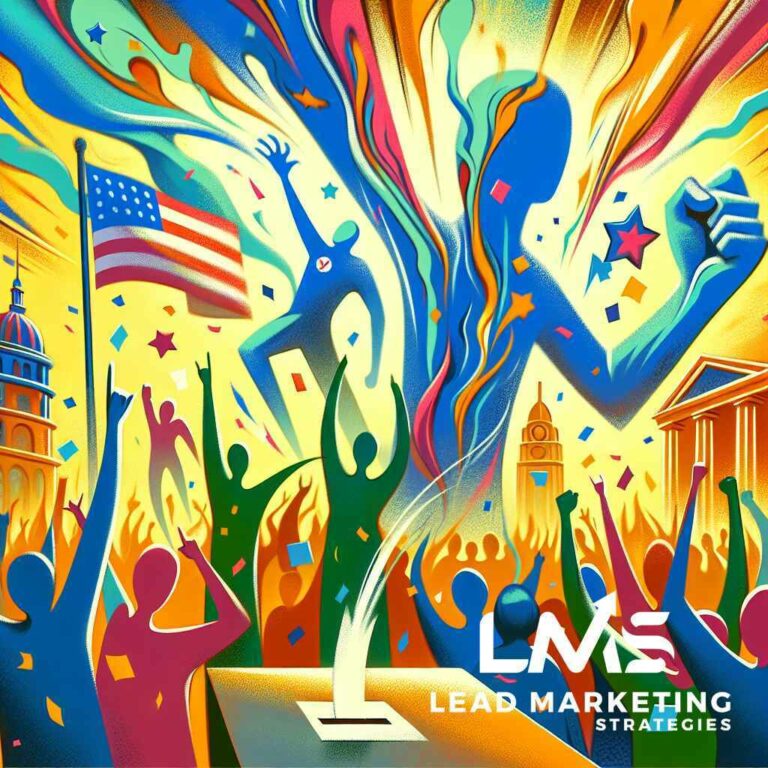Introduction: The Changing Face of Political Campaigning
The Evolution of Political Marketing
In the past few decades, the evolution of political marketing has been remarkable. Traditionally, political campaigns relied heavily on face-to-face interactions, door-to-door canvassing, and mass media advertising. Today, the landscape is dominated by digital strategies that involve sophisticated data analytics, targeted online advertising, and personalized voter engagement tactics. This shift has allowed political marketing to become more agile, responsive, and targeted than ever before. By leveraging modern technologies and digital platforms, political actors can reach voters with unprecedented precision and effectiveness.
The Role of Technology in Modern Campaigns
Technology’s role in politics has evolved from being a peripheral element to becoming a core component of campaign strategy. From social media platforms to data-driven insights, technology enables campaigns to communicate effectively with diverse voter bases. Digital tools facilitate rapid response to political developments, allowing for real-time adjustments in messaging. Moreover, technology enhances voter data analysis, providing deep insights into voter behavior and preferences. With the growing influence of digital campaign tactics, politicians can craft targeted messages that resonate with specific demographics, thereby maximizing their impact and engagement.
Understanding Political Branding in the Digital Age
In today’s digital age, understanding political branding is more crucial than ever. Political branding isn’t just about a candidate’s image but also about how consistently they communicate their values across various media channels. A strong political brand is characterized by both its identity and messaging, creating a coherent narrative that voters can connect with. Effective branding requires a multi-channel approach, employing social media, traditional media, and grassroots efforts to convey a unified message. With the growing significance of branding in political campaigns, politicians must ensure that their digital presence is both authentic and engaging, building trust and lasting connections with their audience.
For more insights into how political marketing can transform your campaign strategies, explore the offerings at Lead Marketing Strategies on Long Island. This expertise underscores the synergy of innovative marketing techniques and political ambitions, shaping the future of political campaigns.
Building a Political Brand: Identity and Messaging
Crafting a Compelling Candidate Narrative
Crafting a compelling narrative is central to building a political brand that stands out. A candidate’s narrative should encapsulate their values, vision, and unique personal journey, creating an authentic connection with voters. This narrative becomes the foundation upon which all candidate messaging strategies are built. A well-crafted story not only humanizes the candidate but also distinguishes them from opponents, forging an emotional bond with the electorate. By integrating this narrative into every aspect of their campaign, from speeches to social media posts, political actors ensure that their core message resonates consistently across all platforms.
Political Brand Identity and Voter Perception
A clearly defined political brand identity plays a crucial role in shaping voter perception. It encompasses the visual elements, tone, and key messages that collectively represent a candidate’s public persona. Establishing a credible and relatable brand identity requires meticulous attention to detail and consistency. Political marketing services can help develop logos, slogans, and visual materials that accurately reflect the candidate’s values and priorities. By employing effective political communication strategies, candidates can establish a trustworthy and dynamic image, fostering confidence and loyalty among potential supporters.
Candidate Messaging and Voter Engagement Strategies
Effective candidate messaging is designed to engage voters on both rational and emotional levels. Strategic use of language and imagery can significantly influence voter attitudes and decision-making processes. Employing diverse voter engagement tactics is essential for reaching different demographics and ensuring widespread resonance. From town hall meetings to digital townhalls and social media interactions, candidates must adopt a multifaceted approach to foster genuine connections with their audience. Innovative engagement techniques not only enhance visibility but also drive participation, bolstering overall campaign success.
Persuasive Political Messaging That Resonates
In the competitive landscape of modern politics, crafting persuasive messaging is essential for campaign longevity and success. Messages must not only be memorable but also compelling enough to drive action. Mastering the art of persuasive messaging in politics requires a deep understanding of audience needs, preferences, and pain points. Political marketing consultants can help candidates refine their communication strategy, ensuring messages are both impactful and aligned with campaign goals. By integrating emotional appeals, data-driven insights, and clear calls to action, candidates can significantly amplify their outreach and effectiveness.

Innovative Digital Campaign Tactics
Election Advertising in the Digital Arena
Digital platforms have transformed election advertising, enabling campaigns to reach audiences with precision and impact. Online election advertising enables campaigns to create highly targeted ads tailored to specific voter demographics and preferences. This shift from traditional media to digital platforms enhances visibility and allows for strategic allocation of resources. Political advertising campaigns leverage data-driven insights to identify potential supporters and deliver compelling messages that drive engagement. As the digital landscape evolves, political actors must continuously adapt their strategies to capitalize on emerging trends and platforms.
Utilizing Campaign Social Media Presence
Social media presence is a powerful tool in the political marketing arsenal, enabling campaigns to engage directly with voters. Platforms like Facebook, Twitter, and Instagram provide avenues for sharing real-time updates, holding virtual town halls, and mobilizing grassroots support. By fostering two-way communication, candidates can cultivate a loyal following and effectively address voter concerns. Social media campaigns enable creative storytelling, enhancing candidate visibility and reinforcing their political brand. For maximum impact, campaigns must maintain consistency in messaging across all channels, ensuring that their social media initiatives align with broader campaign goals.
The Power of Political SEO Techniques
Search engine optimization (SEO) is crucial for increasing the online visibility of political campaigns. The secrets behind political SEO involve optimizing candidate websites and digital content to enhance search engine rankings. Effective political SEO techniques ensure that voters can easily find information about candidates and their platforms. By using relevant keywords and producing high-quality content, campaigns can establish credibility and authority online. Developing a robust SEO strategy enables political actors to effectively compete in the digital arena, making it easier for them to communicate their message and positively influence voter behavior.
Political Email Marketing Strategies for Engagement
Email marketing remains a vital component of modern political campaigns due to its ability to deliver personalized messages directly to voters. Political email marketing strategies prioritize building relationships and maintaining consistent communication with supporters. Campaigns use targeted email lists to provide updates, solicit donations, and encourage volunteer participation. By crafting compelling content and clear calls to action, email campaigns foster engagement and loyalty. As campaigns analyze recipient behavior, they can refine their strategies to optimize open rates and response times, ensuring that their messaging resonates with the intended audience.
The Data-Driven Approach to Campaign Management
Voter Behavior Analysis and Electoral Analytics
Understanding voter behavior is fundamental to crafting successful political campaign strategies. With electoral analytics, campaigns can delve into vast datasets, gaining insights into what drives voter decisions. Predictive modeling enables campaign strategists to anticipate shifts in voter preferences, allowing them to adapt their tactics and stay ahead. Integrating voter data analysis with digital campaign techniques allows for highly targeted outreach, ensuring that campaign messages resonate with specific demographics. By leveraging these insights, campaigns can effectively pinpoint areas where additional resources influence voter turnout and support.
Harnessing Campaign Data Analytics for Success
Harnessing the power of campaign data analytics is crucial for modern electoral strategies. By analyzing data collected from various channels, including social media, email marketing, and voter surveys, campaigns can optimize their resource allocation and targeting. With data-driven insights, campaigns can identify emerging trends and adjust messaging and tactics accordingly. This proactive approach not only enhances voter engagement but also bolsters the campaign’s overall effectiveness. Data analytics provides a competitive edge, enabling political actors to connect with voters on a deeper level and drive meaningful engagement points throughout the electoral process.
The Impact of Campaign Finance Marketing
Campaign finance marketing plays a pivotal role in determining the reach and success of any political campaign. Strategic fundraising efforts can provide the necessary resources for extensive voter outreach and advertising campaigns. Implementing innovative political fundraising online techniques amplifies a campaign’s financial prowess, enhancing its ability to communicate effectively and engage a broader audience. By diversifying fundraising strategies and incorporating digital platforms, campaigns can expand their donor base and maximize financial support, directly impacting their ability to execute a comprehensive electoral strategy.
Strategic Political PR and Community Outreach Initiatives
Effective strategic political PR and community outreach initiatives are crucial for cultivating public trust and establishing a candidate’s reputation. Successful campaigns leverage these tactics to develop and maintain positive relationships with constituents, media, and key stakeholders. Innovative PR strategies can position candidates favorably within the public discourse, shaping their narrative and enhancing their brand visibility. Concurrently, community outreach efforts build grassroots support by involving local communities in campaign activities. These initiatives demonstrate a candidate’s commitment to the values and concerns of their electorate, fostering loyalty and support essential for electoral success.

Conclusion: The Future of Political Marketing
The Ongoing Evolution of Campaign Strategies
As we move further into the digital age, the landscape of political campaigns continues to evolve. Political marketing strategies are shifting toward more data-driven and digitally focused approaches, enhancing candidates’ ability to resonate with voters effectively. The increasing reliance on analytics and digital tools reflects a significant shift from traditional methods to innovative strategies. Campaigns are now characterized by their agility, adaptability, and use of modern electoral strategies to anticipate and meet voter expectations. The ability to leverage data for strategic decision-making is becoming indispensable, paving the way for more nuanced and targeted political narratives.
Balancing Tradition and Innovation in Political Marketing
While the digital transformation of political marketing is undeniable, the importance of traditional campaign elements persists. Successful campaigns strike a balance between tried-and-true methods and cutting-edge innovations. Face-to-face interactions, grassroots efforts, and analog communication still play a vital role in nurturing voter trust and authenticity. Political actors must ensure they integrate digital campaign tactics with classical outreach to foster comprehensive voter engagement. By combining innovative approaches with traditional wisdom, candidates can develop robust, multifaceted strategies that appeal to a broader audience while maintaining their political brand identity.
Preparing for Future Election Cycles with Advanced Technologies
Advanced technologies and digital solutions will likely dominate the future of political campaigning. As technology continues to advance, so will the tools available for political marketing, including artificial intelligence, augmented reality, and voter targeting algorithms. Preparing for future election cycles involves investing in these technologies to enhance campaign effectiveness and voter engagement. Politicians who embrace these advancements will be better equipped to craft compelling narratives, optimize online election advertising, and elevate their digital footprints. By staying ahead of technological trends, political marketers can ensure they remain competitive and effectively connect with evolving voter populations, including engaging Gen Z voters, who are becoming increasingly influential in shaping political outcomes.
Frequently Asked Questions
Question: How do Political Marketing Strategies enhance voter engagement through digital campaign tactics?
Answer: Political Marketing Strategies specializes in employing innovative digital marketing techniques to boost voter engagement. By leveraging social media marketing for elections and political content marketing, our firm effectively reaches diverse voter demographics. Through carefully crafted candidate messaging and interactive campaign social media presence, we facilitate direct communication with voters, encouraging participation and fostering a sense of community. Our data-driven approach ensures that every message is tailored to resonate with target audiences, thus enhancing engagement and participation.
Question: What unique advantages does Political Marketing Strategies offer in political SEO and online advertising?
Answer: At Political Marketing Strategies, we utilize advanced political SEO techniques to optimize candidate websites and digital content, ensuring high visibility and accessibility for voters. Our expertise in political website optimization allows us to enhance search engine rankings, making it easier for voters to find information about candidates and their platforms. Additionally, our innovative PPC advertising strategies for elections help deliver targeted messages that reach specific voter segments efficiently and effectively, maximizing campaign reach and impact.
Question: How does the blog title ‘What Is the Role of Political Marketing in Modern Campaigns’ reflect the services offered by Political Marketing Strategies?
Answer: The blog ‘What Is the Role of Political Marketing in Modern Campaigns’ encapsulates the pivotal services that Political Marketing Strategies provides. Our focus on modern electoral strategies integrates political communication technology to craft persuasive political messaging that resonates with voters. By employing strategic political PR and campaign data analytics, we ensure that campaign messaging is both relevant and impactful. Our comprehensive political marketing solutions are designed to align with the evolving landscape of political campaigns, utilizing advanced technologies to meet electoral goals efficiently.
Question: In what ways can Political Marketing Strategies assist in building a strong political brand identity?
Answer: Political Marketing Strategies excels at developing a robust political brand identity by combining strategic political PR and innovative digital campaign tactics. We focus on creating a coherent narrative and visual identity that embodies a candidate’s values and priorities. Our political brand development services include crafting compelling narratives and effective multimedia political marketing content. By maintaining consistency in messaging across all platforms, we ensure that candidates foster trust and loyalty among voters, strengthening their political brand identity and enhancing overall campaign effectiveness.
Question: How do Political Marketing Strategies utilize electoral analytics for campaign success?
Answer: Political Marketing Strategies employs electoral analytics to gain deep insights into voter behavior and preferences, allowing us to refine and optimize campaign strategies. By integrating sophisticated campaign data analytics, we identify emerging trends and adjust our messaging to resonate with target demographics effectively. This data-driven approach enables us to allocate resources strategically and enhance voter engagement and outreach. Our focus on voter behavior analysis helps political campaigns adapt to changes in voter sentiment, ensuring sustained success in achieving electoral objectives.



